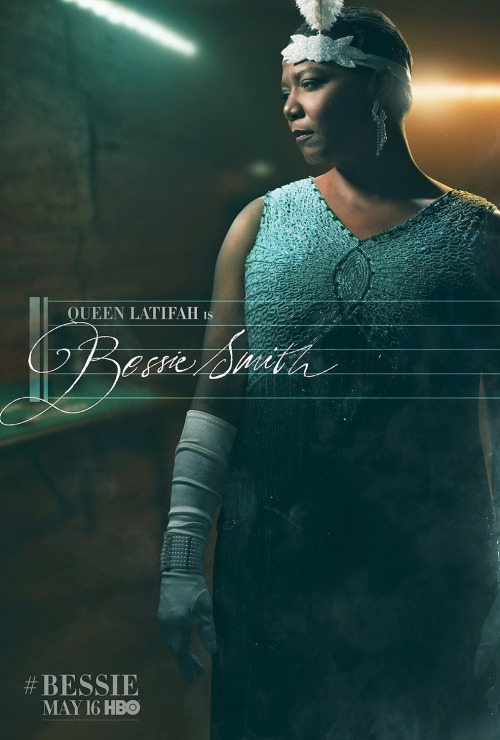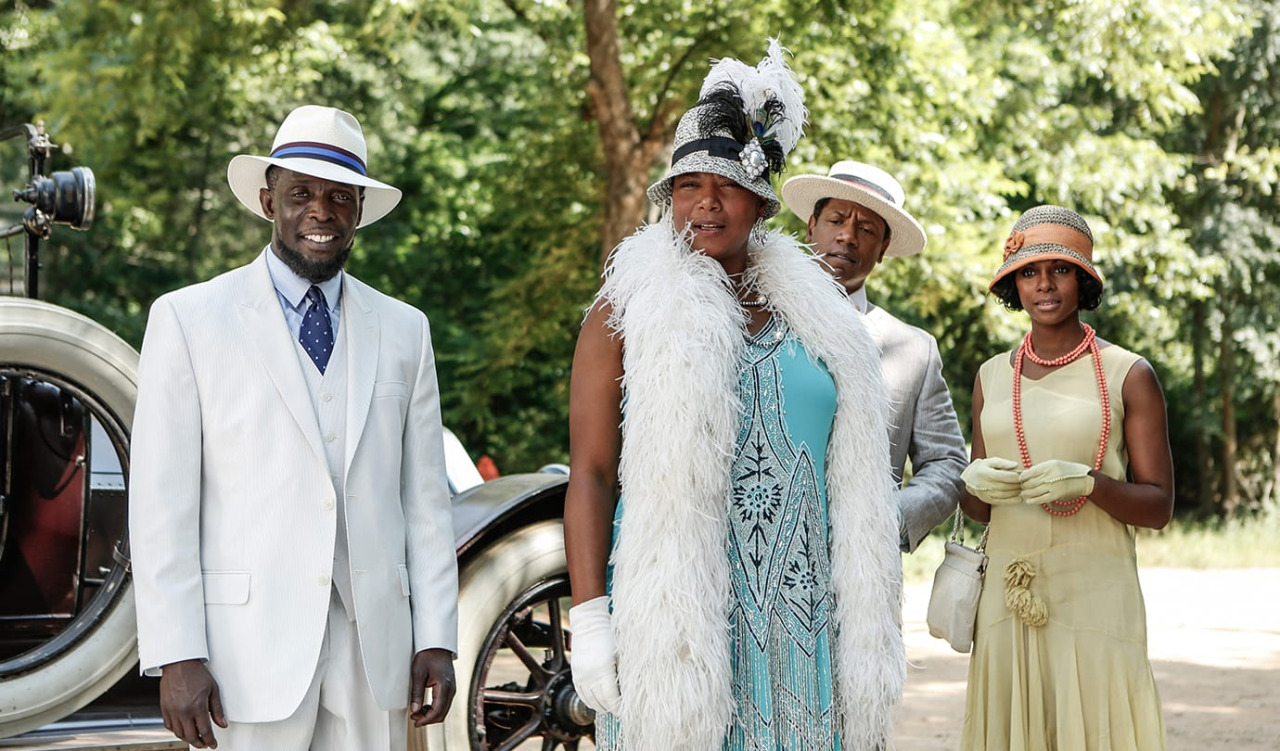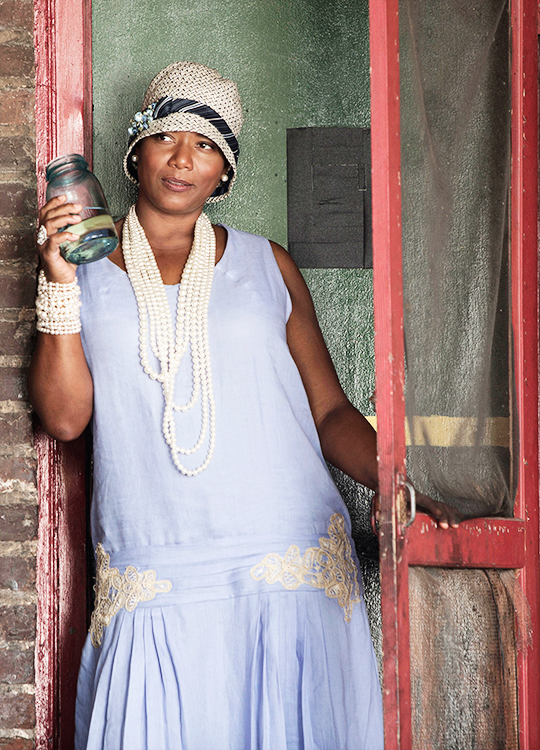TFE's newest contributor Angelica Jade Bastién on HBO's latest biopic

For over two decades Queen Latifah has been trying to bring the life of Bessie Smith, the legendary "Empress of the Blues" who found success in the 1920s and 1930s, to the screen. Despite Bessie's life being a perfect mix of glamour and tragedy that's tailor-made for the biopic treatment it has taken years for the story to come to fruition. I'm not surprised it has taken Latifah this long to bring Bessie's story to life. Bessie Smith (Queen Latifah) is a rough hewn, country, bisexual, and passionate broad. The film doesn't sand off her edges or shy away from her contradictions but embraces them. Bessie tracks the legend from her early days as a singer with her older brother/manager, Clarence (Tory Kittles) always in her corner, to the Great Depression when all her personal and professional success falters.
Anyone familiar with women's pictures knows the emotional terrain Bessie is covering. But what makes this women's picture downright transgressive is its sympathetic, multi-layered portrayal of black queer desire...
Bessie understands the complicated and complex woman at its center and doesn't sugar coat her faults even as it celebrates her triumphs.
If I had to sum up the film in one scene I would point to when we see Bessie sitting down in front of the mirror. She takes off her wig and eyelashes. There is something both melancholy and combative in her gaze. She's naked in every sense of the word. It is in intimate moments like this that writer/director Dee Rees (Pariah) excels in crafting her story. But for all its sumptuous glory and magnificent performances, Bessie falters in the way of many biopics before it.
 L to R: Jack Gee (Michael K. Williams), Bessie Smith (Queen Latifah), Clarence (Tory Kittles) and Lucille (Tika Sumpter).
L to R: Jack Gee (Michael K. Williams), Bessie Smith (Queen Latifah), Clarence (Tory Kittles) and Lucille (Tika Sumpter).
Dee Rees was able to gather an impressive cast and the standouts include: Mo'Nique as Ma Rainey,"The Mother of the Blues" who begins the narrative more successful than Bessie and later becomes a confidante after a falling out; Michael Kenneth Williams as Jack Gee, Bessie's equally volatile husband; and Tika Sumpter, whose vulnerability and tenderness as Bessie's longtime lover Lucille, provides a different energy than her costars.
While everyone is bringing their A-game to Bessie, Queen Latifah is undoubtedly the star. She brings layers and a quiet intensity to the legend making her feel remarkably human and real. I can't overstate how amazing she is here. From her physicality to her gaze, Latifah embodies the humor, yearning, and complexities of this larger-than-life woman.
Unfortunately, the script often feels like it is working against the actors rather than for them. Too many great moments go by far too quickly to resonate. The pacing and structure of the film is by far its biggest downfall. Instead of letting us sit and savor what's happening everything moves at a startingly pace. There are so many layers to how Bessie handles sexuality, race, family, and gender dynamics that it is a shame that the film can't slow down to dig deeper and appreciate them.
 Writer/director Dee Rees on set with star, Queen Latifah
Writer/director Dee Rees on set with star, Queen Latifah
It honestly becomes infuriating how the film continues to check things off the well worn list of expected biopic must-haves. Either Bessie should have been a short miniseries or it should have constrained its time period a little more to give it a chance to fully grapple with the many ideas it appears interested in covering.
Thankfully writer/director Dee Rees is smart enough to give a few moments of breathing room as when Bessie reconnects with her older sister, Viola (Khandi Alexander) who raised her. When the film slows down it excels at intimacy to show us how deep Bessie's appetites go (like a sex scene between Bessie and Mike Epps as Richard) or her appearing emotionally and physically naked in the mirror. But the film doesn't give us enough of this to reach greatness.
Beyond the performances, the film is gorgeous to look at.
 One of the best costumes from the film.
One of the best costumes from the film.
Cinematographer Jeffrey Jur, who has done work on Carnivale and Mad Men, and costume designer Michael T. Boyd, bring to life the era of Bessie's success and tragedy during the 1920s and 1930s. Together they often make Queen Latifah a most powerful presence in the frame, even when she's stripped down. And yes, the music is just as amazing as it should be in a biopic based on Bessie Smith.
Despite the pacing and structure issues the film is thematically rich particularly in regards to race and gender. There are several moments where white people are unsurprisingly terrible ranging from uppercrust psuedo-intellectualism to the heinous backwoods, torch carrying brand of racism. One good white person who flutters in late in the film (John Hammond played by the handsome Bryan Greenberg) offers Bessie a way out of her post-Great Depression slump. Dee Rees and the other writers make a good choice to look beyond the usual white/black race dynamics, though, and dig a bit depper. Far too often what becomes central to the lives of black people in the media, especially when it comes to period pieces, is how they relate to white people whether it be unconventional love stories (Belle), master/slave dynamics (12 Years a Slave) or fighting for our rights (Selma).

These stories have a place and some of them I even love. But frankly, I get tired of being bombarded in film with just how terrible it supposedly is to be black. Thankfully, Bessie is as proud of its blackness as its leading lady. Bessie touches on race relations because they can't be ignored, they are woven into the tapestry of Bessie's life like any other person of color, including myself. The film wonderfully explores the way black people relate to each other.

Colorism isn't shied away from. We see it when Bessie exclaims "No yellow bitches!" during an audition for show members. It will probably become a meme if it hasn't already. The most interesting moment though comes when Bessie, Clarence and Jack Gee are face-to-face with the light skinned, exceedingly proper powers-that-be behind Black Swan Records. Seeing these two very different representations of blackness on either side of the table was a powerful moment.
Bessie is the antithesis to the men across from her in this scene. She's dark skinned, brutally honest, runs on gut instinct, and is exceedingly vulgar. She's proud of her brand of blackness where they seem increasingly uncomfortable by it. Watching this I realized I have been on both sides of the table. To this day, black people wrestle with respectability politics. Bessie is refreshing for how much she stays true to herself even when it costs her a certain kind of success we're told to strive for.
 Mo'Nique as Ma Rainey
Mo'Nique as Ma Rainey
Bessie also deftly layers the relationships between black women, especially queer black women. When Bessie reconnects with Ma Rainey after her own life goes under, the theme of sisterhood comes into focus. Seeing these two larger-than-life women truthfully joke about how white media pigeonholes us and compares us to each other in demeaning ways was a breath of fresh air. When was the last time two queer black women artists were so human and frank about their place in the world on screen? That scene could be from a present day film or hell, a conversation I have with fellow women of color artists on a regular basis which speaks to how little has changed. Bessie doesn't overplay how timeless these images and conversations of black sisterhood and artistry are because it doesn't have to.
The film smartly ends on an illuminating note about Bessie's character rather than taking us all the way to her death, which is what I was expecting it to do. If only the rest of the film gave its legendary character more moments to breathe.
Grade: B
 Angelica Jade Bastién is a Southern born essayist and screenwriter. She's written for Bustle and Bright Wall/Dark Room. She primarily writes about noir, Old Hollywood, and female madness. 'The Feminine Grotesque' is the best way to describe her aesthetic. She is currently obsessed with the beauty of Cary Fukunaga, baking the perfect pie, and Bette Davis. You can find her musings and other writerly experiments on her site, Madwomen & Muses. [Follow Angelica on Twitter]
Angelica Jade Bastién is a Southern born essayist and screenwriter. She's written for Bustle and Bright Wall/Dark Room. She primarily writes about noir, Old Hollywood, and female madness. 'The Feminine Grotesque' is the best way to describe her aesthetic. She is currently obsessed with the beauty of Cary Fukunaga, baking the perfect pie, and Bette Davis. You can find her musings and other writerly experiments on her site, Madwomen & Muses. [Follow Angelica on Twitter]
You can read more about the entire Film Experience team at our "About" Page